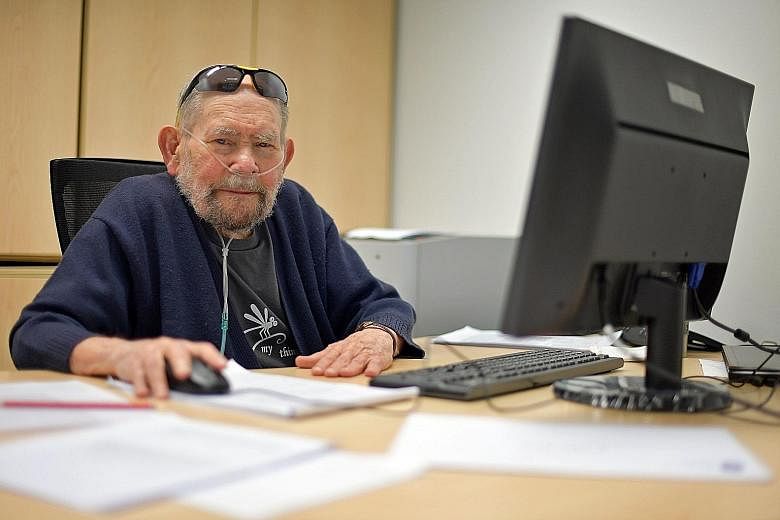He is 90 years old, suffers from lung disease, requires a constant supply of air from an oxygen tank and has survived a failed heart valve - and yet Dr Sydney Brenner lets nothing keep him from his research.
In fact, when asked what he did to recover from his heart disease and subsequent valve implantation last year, he simply said: "I went back to work."
Awarded the Nobel Prize in physiology or medicine in 2002, the biologist has contributed immensely to the scientific landscape in Singapore since coming here in 1984.
Dr Brenner is one of the founding fathers of modern biology and has shaped the study of molecular genetics and DNA sequencing, among other contributions.
His role in deciphering the genetic code helped lay the foundation of modern molecular biology and put Singapore on the scientific world map.
In 2003, he became the first honorary citizen of Singapore, the highest form of recognition given by the Government for outstanding contributions to Singapore's growth and development.
Dr Brenner was born in Germiston, a small town in South Africa. His father was a shoe repairer, and the family's first home was in the rooms at the back of his father's shop.
According to Dr Brenner's biography on the Nobel Prize webpage, his father never learnt to read or write.
While in high school, Dr Brenner stumbled upon the public library in his town. He wrote: "It was here that I found a source of knowledge and the means to acquire it by reading, a habit of learning which I still follow to this day."
At 15, he attended the University of the Witwatersrand in Johannesburg on a bursary to study medicine, while most of his peers were in or just starting high school.
In the 1950s, his career progressed rapidly from the relative isolation of South Africa to Oxford University and the top scientific institutions in the United States.
The turning point came when he heard that scientists Francis Crick and James Watson, the forefathers of DNA research, had solved the structure of DNA.
Dr Brenner and his friends drove to Cambridge to see the model.
"The moment I saw the model and heard about the complementing base pairs, I realised that it was the key to understanding all the problems in biology we had found intractable - it was the birth of molecular biology."
His own discovery, along with his colleagues, of messenger RNA - the molecule in cells that communicates codes from the DNA, conveying genetic information to facilitate protein synthesis - and his work with Dr Crick to show that the code was composed of triplets, are some of the studies he is most famous for.
Dr Brenner also recognised the potential of C. elegans, a 1mm-long worm with a transparent body and simple nervous system, for studying developmental biology, establishing it as a new model organism .
It was for this that Dr Brenner and his former postdoctoral fellows John Sulston and Bob Horvitz were awarded the Nobel Prize.
Outside of his work in research, he has also contributed much to science through education. He has been a part of Singapore's Institute of Molecular and Cell Biology since its beginning and has seen it grow into the world-class institution it is today.
As a beneficiary of newer technology that has saved his life, Dr Brenner has donated to and is an advocate of The Heart Fund - Keep The Beat, a fund-raising campaign by the National University Heart Centre Singapore. The fund enables needy patients to benefit from more innovative treatments, which current financial assistance schemes do not cover.
Dr Brenner and his late wife have four children. They live in Britain and visit him occasionally.
He wrote in his Nobel Prize biography: "My wife and family have borne the burden of a preoccupied husband and father for 50 years.
"Living most of the time in a world created mostly in one's head does not make for an easy passage in the real world."
Dr Brenner, who lives in a hotel near Orchard Road, continues to work with the Agency for Science, Technology and Research (A*Star) and has a driver to ferry him to and from his office at Fusionopolis daily.
Even now, he still enjoys the adrenaline rush of discovery and learning, and remains dedicated to his work. "I do not do anything but work. I am beyond all those other things," he said.
When asked why he works as hard as he does, he said: "Because that's what I do - discover new things, things that wouldn't be known if not for me.
"I am always asking questions."


